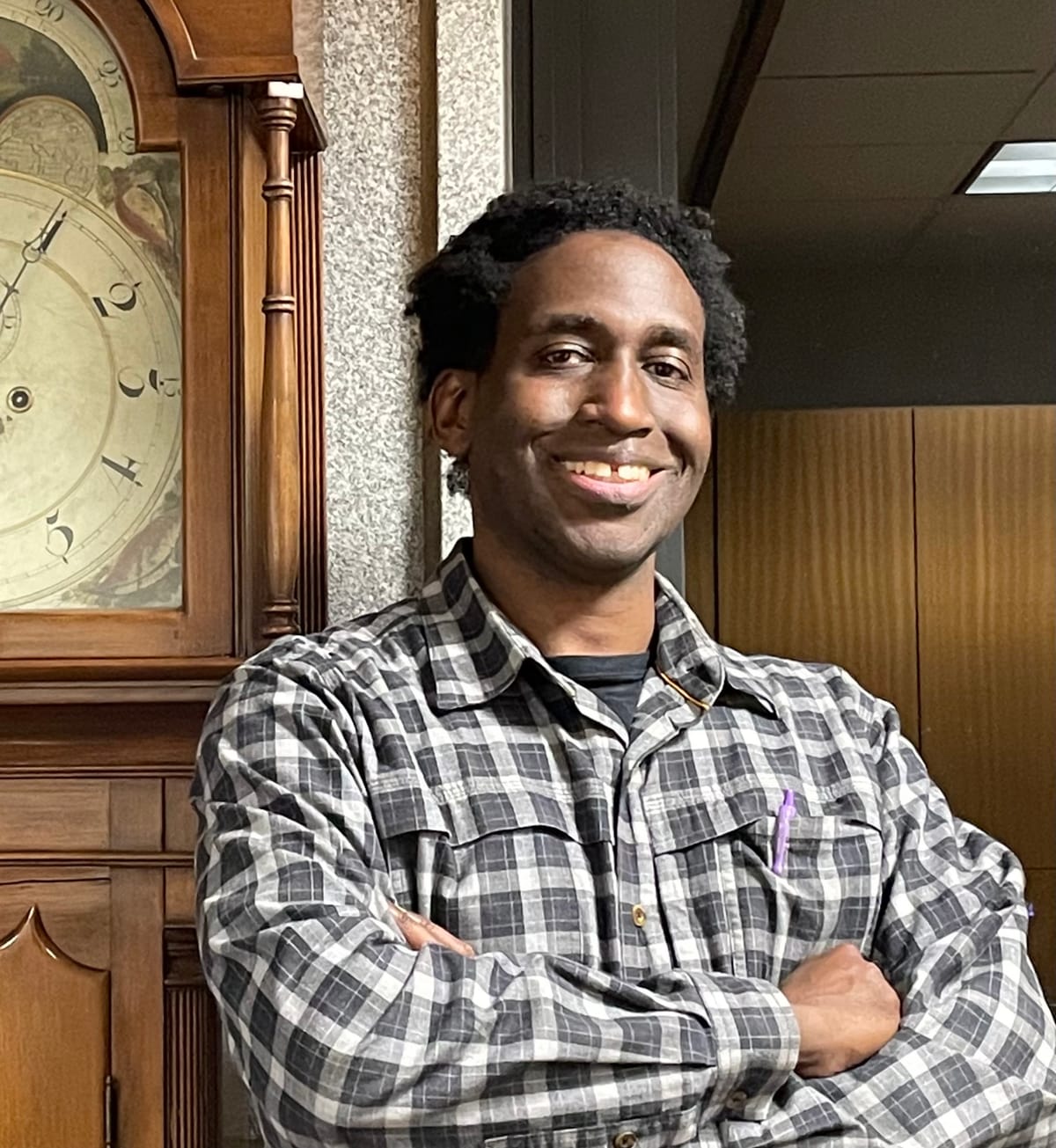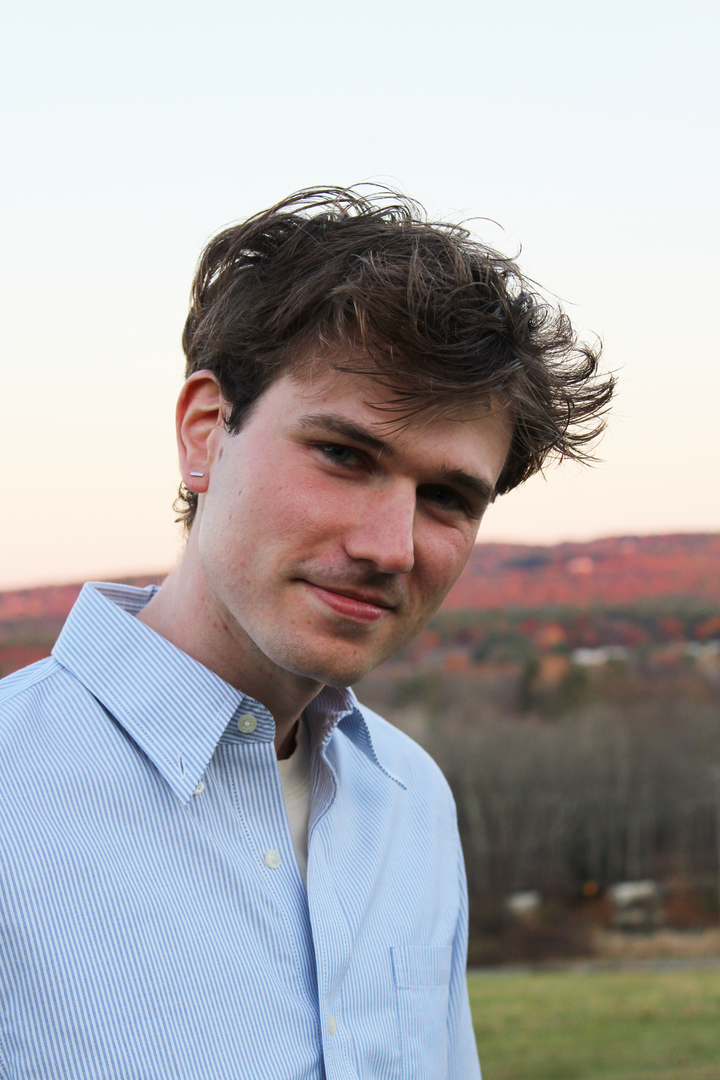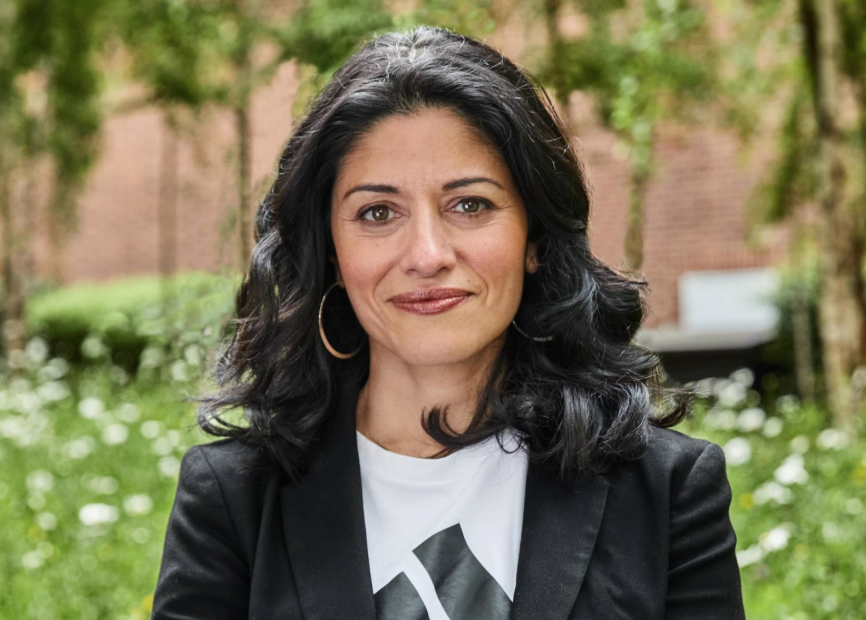Staff Spotlight: Bilal A. Muhammad ’99
Bilal A. Muhammad ’99 works in Frost Library as the evening circulation student supervisor and specialist. He spoke with The Student about his role at Amherst, his podcast, and returning to the Pioneer Valley.

If for you Frost Library is merely a place to catch up on missed assignments, grab a latte, socialize with friends, or pull all-nighters (or until-1-a.m.-nighters), you may not be aware of all the work that student and non-student staff members do behind the scenes in the building. I wasn’t either until just last week, when I had the pleasure of talking to Bilal A. Muhammad, who has been a Frost staff member for nearly 20 years.
Muhammad, who graduated from Amherst in 1999, has served as Frost’s evening circulation student supervisor and specialist since 2004. You can find him in the library from 5 p.m. to 1 a.m. Sundays through Thursdays throughout the semester.
In addition to overseeing maintenance in Frost by checking for water damage after storms and ensuring that items aren’t lost or stolen, Muhammad is in charge of managing student workers in the library as well. Much of his time is spent in the stacks with Frost’s book collection — which has over 1.3 million print copies — making sure that books are placed correctly and not damaged from natural elements or general wear and tear. And of course, part of his job is ad hoc: “There are always funky things: with someone’s account, someone put a barcode in wrong, some book isn’t properly in the system. I do a lot of that stuff,” Muhammad said.
But if you ever come across Muhammad in Frost during one of your late-night study sessions, know that there is much more to him than meets the eye. In his free time, he hosts a podcast with his brother and a few friends — some of whom are Amherst alumni as well. Every few months, they come together and record the B.E.G.I.N podcast (an acronym for their names: Bilal, Eraun, Garick, Ismail, and Neil). They started recording the podcast in 2018, and it now can be found on Instagram, SoundCloud, and iTunes, where it has a 5-star reviewer rating.
“We get together and talk about nerdy movies from the Black perspective,” Muhammad said. “We mainly talk about nerdy movies, sci-fi, fantasy, comic books. We’re all huge comic book fans.” While he recommended that anyone interested in movies and film give it a listen, he always gives a NSFW warning. “If we don’t like something, we definitely don’t sugarcoat it,” he said.
Muhammad prides himself on the fact that he is a “Blerd” — a Black nerd. Although he credits the classes he took at Amherst for igniting his interest in film, Muhammad also traces his love for movies back to his childhood. “I come from a movie family,” he explained. He says that he can quote James Cameron’s “Aliens,” his favorite movie of all time, line by line with his brother. “My dad quoted movies all the time when he was alive,” he added. “It’s kind of a shorthand that we have.”
Muhammad’s options in terms of film were somewhat limited when he first got to Amherst. “They started doing film video production stuff my junior year at Amherst for the first time,” he said. “Before that, it was more like the poetics of cinema and film. They had their first production class my junior year. That was the first class I got an A in and that I worked really hard in.”
But Muhammad’s time at Amherst wasn’t smooth sailing for all four years. On the contrary, he struggled quite a bit his freshman year — both academically and with his mental health. “I failed three classes. I was on academic dismissal. I had to leave the school,” he said.
Looking back, he realizes that a large part of his struggle derived from the fact that his brother was not admitted into Amherst. “My brother is a year younger than me, and he’s way smarter than me … and Amherst didn’t let him in,” he said. “That sent me into what I now recognize, looking back, was a deep depression. I stopped going to class. I didn’t care about Amherst.” Upon further reflection, Muhammad realized that his depression stemmed from the idea that if his brother wasn’t good enough to be at Amherst, he wasn’t either.
“[My brother] ended up going to Wesleyan, which was better for him,” he added, “but I was very disaffected and struggled my second semester at Amherst.”
Because he was on academic dismissal, Muhammad left Massachusetts and headed home to Chicago. His parents made it clear that he had to get a job, so he started working at a local Staples. “I saw people who were around my age who had just graduated from high school and they didn't go to college. And they were supporting like two or three kids on minimum wage,” he said. Seeing that, and amid the urging of his closest friends to return to campus, Muhammad decided to give Amherst another try.
When he got back to school, things began to look up for Muhammad. He met a girl at Smith who he started dating. He began going out to the other colleges in the Five College Consortium much more and making friends who were African American and American Descendants of Slavery (ADOS). “That made a big difference in my experience, meeting more people of color. Particularly from my background as an ADOS person. That was really, really important,” he said.
Around this time, Muhammad also found his interest and success in film. Despite his official major in law, jurisprudence and social thought, he considers himself a film minor because of the wide breadth of media-related classes he took in college.
After Muhammad graduated in 1999, he lived in Los Angeles for six months and worked on various short films. “I left [the area] because my sister was actually going to Amherst at the same time, and I wanted [her] to develop her own personality and have her own space,” he said. He then lived and worked on and off in New York before returning to his beloved alma mater.
“The job at Amherst allowed me to work full time for a decent wage and at the same time pursue outside interests like my podcast,” he said. “Also, this is the safest [area] I have ever lived [in]. Coming from an area in Chicago with violent crime, it has been nice to live somewhere where I don’t have to think too much about locking my doors.”
His biggest piece of advice for current Amherst students is to have fun and try to take some pressure off, if possible. “Enjoy college for college,” he said. “You have 90 percent of the freedom with 10 percent of the responsibility. You get a little bit more freedom when you leave college, but you get a lot more responsibility. You should fully take advantage of it.”





Comments ()